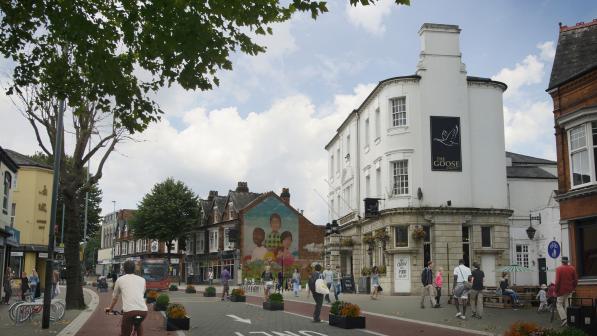Statement on the Queen’s Speech and Transport Bill

The Government has announced that the Transport Bill will include measures to reform Britain’s railways, to speed up the introduction of charging points for electric vehicles (EVs), and to regulate:
-
Automated (or autonomous) vehicles;
-
Electric scooters (or ‘e-scooters’) and other ‘micro-mobility’ vehicles; and
-
Pedicabs (or rickshaws).
Meanwhile its Levelling Up and Regeneration Bill will, among other things, enable the delivery of more housing and other new developments.
Cycling UK will be urging Ministers, MPs and Peers to maximise the benefits and avoid potential pitfalls, as follows:
- The Levelling Up and Regeneration Bill must ensure that the location of new developments, as well as the design of associated road and path networks, supports the growth of cycling, walking and other sustainable transport options, rather than further entrenching car-dependence, as has been too common with housing developments in recent decades.
- The Transport Bill’s rail reform proposals are an opportunity to embed in law the Government’s promises to increase cycle spaces on new and refurbished trains, and to improve the process for making cycle reservations on longer-distance train services.
- The provisions for EV charging points need to ensure that councils do not allow them to be installed where their cables could obstruct future cycle tracks, bearing in mind that charging points cannot be relocated easily.
- The provisions for automated vehicles (AVs) must ensure that the manufacturers of AVs and their operating systems are presumed to be at least partially liable for compensating pedestrians, cyclists and other unprotected road users who are injured in collision with a self-driving vehicle, unless the vehicle’s systems show that the injured party was wholly at fault – with full compensation being payable in cases where the victim is a child or other vulnerable person. Otherwise, the victim – who may have no insurance and whose injuries may mean they cannot recall the incident – faces the additional burden of identifying whether the vehicle was being driven or driving itself and, in the latter case, bringing a claim against a corporation that held all the evidence.
- Cycling UK has long called for plans to regulate pedicabs, as the near-absence of a regulatory framework for pedicabs in London has allowed irresponsible and unsafe pedicabs and pedicab operators to flourish, undermining the reputation and economic viability of those trying to operate pedicabs safely and responsibly. However the Bill must also address the situation outside London, where we have the opposite problem. Outside London, the requirements are so onerous that, in practice, pedicabs are unable to operate at all on a hire-and-reward basis, even where the local authority wishes to support them.
- Finally, Cycling UK and its allies will seek opportunities in the Bill to revive a dormant legal requirement for the Transport Secretary to consider setting targets to reverse the growth of motor traffic, in the light of concerns such as congestion, road danger, physical inactivity, air pollution, impacts on the built and natural environment, and the climate. At present, the Secretary of State is only required to do this “at such times as he deems appropriate” – and in practice, this has only happened once, 22 years ago. Given the social, economic and environmental costs of rising traffic levels, we believe it is high time to halt and reverse these.
Cycling UK’s policy director Roger Geffen said:
“The Government and Parliament have two major legislative opportunities to place safety, sustainability and active travel at the heart of our transport and land-use planning systems. They must reduce car dependence by ensuring that the location and layout of new developments support cycling and other forms of clean and healthy travel, and by making it easier to combine cycling and train travel. They must also ensure that the regulation of autonomous vehicles, e-scooters, pedicabs and the provision of electric vehicle charging points supports the growth of cycling, avoiding pitfalls that might undermine the Government’s ambition to boost cycling and walking to 50% of trips in towns and cities by 2030.
“I also hope the Transport Bill will provide an opportunity to strengthen this target, by requiring the Government to regularly consider setting wider targets to halt and reverse the growth of road traffic. Given the crises we face of congestion, air pollution, road danger, physical inactivity and the climate, it is vital to reduce our dependence on private motor vehicles and to boost opportunities for clean and healthy travel.”
Notes to editors
Cycling UK, the UK’s cycling charity, imagines a world where the streets are free of congestion and the air is clean to breathe, where parents encourage their children to cycle to school and everyone shares the exhilaration of being in the saddle. For more than 140 years, we’ve been making our streets safer, opening up new traffic free routes and inspiring more people to cycle more often. www.cyclinguk.org
Press contact information
For more information, please contact the national Cycling UK press office. Due to the restrictions caused by the coronavirus outbreak, currently the main press office number (01483 238 315) is not being monitored. If you would like to speak to a member of the press office during working hours (0900 - 1700) please email [email protected]. Out of hours, call 07786 320 713






